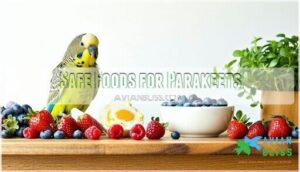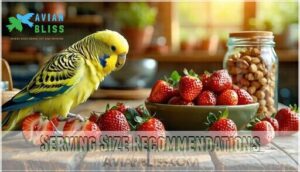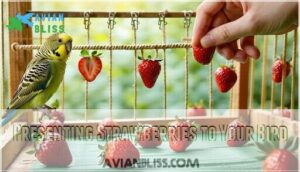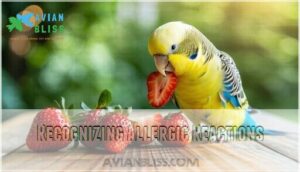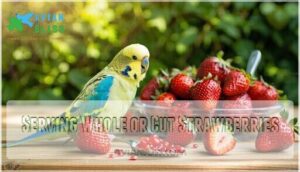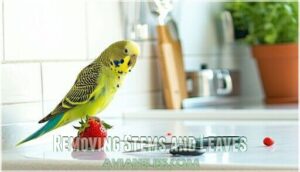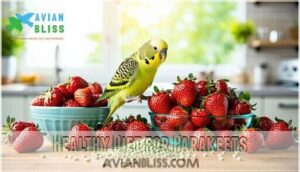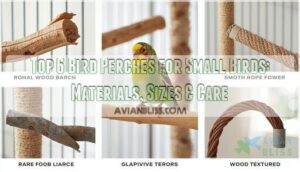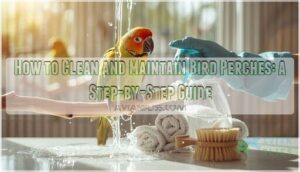This site is supported by our readers. We may earn a commission, at no cost to you, if you purchase through links.
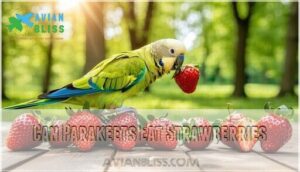
You’ll want to wash them thoroughly to remove pesticides and offer only small portions since their natural sugar content can cause weight gain if given too frequently.
Organic strawberries are your safest bet, think of strawberries as candy for your feathered friend—delicious but best enjoyed sparingly.
Always remove stems and leaves before serving, and watch for any digestive upset when introducing new foods.
Most parakeets love the sweet taste, making strawberries a perfect training reward or special occasion snack.
The key lies in proper preparation and portion control.
Table Of Contents
- Key Takeaways
- Parakeets Eating Strawberries
- Can Parakeets Eat Strawberries
- Safe Foods for Parakeets
- Feeding Strawberries to Parakeets
- Strawberry Preparation Tips
- Healthy Diet for Parakeets
- Frequently Asked Questions (FAQs)
- Can a parakeet eat a strawberry?
- Can parakeets eat strawberries?
- Can eating strawberries be bad for you?
- Can parakeets eat raspberries?
- Can parakeets eat blackberries?
- Are strawberries toxic to parakeets?
- What fruits can parakeets not eat?
- Do budgies eat strawberries?
- What is a parakeets favorite food?
- How often can parakeets have strawberries?
- Conclusion
Key Takeaways
- You can safely feed your parakeet strawberries as occasional treats – they’re packed with vitamin C, antioxidants, and fiber that support immune function and overall health.
- Always wash strawberries thoroughly and remove stems before serving – this eliminates harmful pesticides and prevents choking hazards for your bird.
- Limit strawberries to 1-2 small pieces once or twice weekly – too many can cause digestive upset and nutritional imbalances due to their natural sugar content.
- Watch for allergic reactions when introducing strawberries – monitor for breathing difficulties, swelling, or behavioral changes, and stop feeding if you notice any concerning symptoms.
Parakeets Eating Strawberries
You’ve probably wondered if your parakeet can safely enjoy those juicy strawberries you’re snacking on.
The good news is that strawberries are both safe for parakeets and provide valuable nutrients when offered as an occasional treat.
Strawberries offer parakeets a nutritious, safe treat that brightens their diet with essential vitamins and antioxidants.
Nutritional Benefits of Strawberries
Strawberries pack impressive nutritional benefits that make them excellent parakeet healthy treats.
These vibrant berries deliver essential nutrients supporting your bird’s overall health and well-being.
Here’s what makes strawberries valuable for parakeet nutrition facts:
- Vitamin Content – High vitamin C levels boost immune function and tissue repair
- Antioxidant Effects – Anthocyanins and polyphenols protect cells from damage
- Fiber Benefits – Dietary fiber promotes healthy digestion and gut bacteria
- Mineral Richness – Manganese, potassium, and folate support metabolic functions
- Nutrient Value – Low calories with high water content provide hydration
Can parakeets eat fruit like strawberries? Absolutely.
Parakeet eating strawberries offers natural sugars for quick energy while delivering protective compounds that combat inflammation and support heart health.
The high antioxidant content in strawberries provides numerous health benefits that can enhance a parakeet’s overall well-being.
Preparing Strawberries for Parakeets
Proper preparation transforms strawberries into safe parakeet treats.
Start with thorough strawberry rinsing under cool water, focusing on pesticide cleaning to remove harmful residues.
Can parakeets eat fruit safely? Yes, when you handle berry safety correctly.
Remove stems completely—most birds won’t eat them anyway. Seed removal isn’t necessary since strawberry seeds are safe.
Pat dry before fruit serving to reduce excess moisture that attracts bacteria. Understanding the role of strawberry seeds is vital for proper handling and preparation.
Feeding Strawberries to Parakeets Safely
Moderation becomes your best friend when offering strawberries for parakeets as healthy treats.
Start with tiny pieces to check for bird allergies before expanding their fruit variety.
Monitor parakeet eating habits closely – some birds dive right into their parakeet fruit diet while others need encouragement.
Strawberry nutrition supports parakeet digestion, but limit portions to prevent upset stomachs.
Remember, safe fruits for parakeets work best when introduced gradually, letting your feathered friend adjust to new flavors at their own pace.
Can Parakeets Eat Strawberries
The simple answer is yes – parakeets can safely eat strawberries as an occasional treat.
These vibrant berries pack impressive strawberry nutrition that supports parakeet health, including vitamin C for immune function and antioxidants that combat free radicals.
However, fruit safety requires understanding that strawberries contain natural sugars that can disrupt dietary balance if overfed.
Your parakeet’s eating habits should include strawberries sparingly – think of them as dessert rather than a meal.
While safe fruits for parakeets like strawberries offer bird wellness benefits, they shouldn’t exceed 5% of your bird’s daily intake.
A well-structured parakeet diet plan prioritizes pellets and vegetables, with strawberries for birds serving as special rewards.
The key lies in moderation.
Too many strawberries can lead to nutritional imbalances, while the right amount provides enrichment and essential nutrients.
Your feathered friend will likely enjoy tearing apart these juicy treats, making strawberries for parakeets both nutritious and entertaining.
Understanding the strawberry nutrition benefits is vital for maintaining a balanced diet for your parakeet.
Safe Foods for Parakeets
Beyond strawberries, your parakeet can enjoy several other safe foods that provide essential nutrients and variety.
Eggs offer protein and calcium, while other berries like blueberries and raspberries deliver antioxidants and vitamins that support your bird’s health.
Eggs
Protein powerhouses like eggs transform your parakeet’s diet into a nutritional goldmine.
Transform mealtime into a nutritional adventure with eggs as your parakeet’s protein-packed powerhouse.
You can offer boiled eggs, scrambled eggs without butter, or even egg whites as part of your parakeet diet plan.
Don’t toss those egg shells—they’re calcium-rich treasures that support bone health.
These bird safe foods provide essential egg nutrition that complements your parakeet feeding guide perfectly.
Other Berries
Beyond eggs, berries reveal a treasure trove of nutrition for your feathered friend. Blueberry Benefits include antioxidants and vitamin C, while Raspberry Nutrition provides fiber and natural sugars. These colorful treats complement strawberries perfectly in your parakeet’s diet.
Safe berry options include:
- Blueberries – Rich in antioxidants and vitamin A precursors
- Raspberries – High fiber content aids digestion
- Blackberries – Natural energy source without harmful additives
- Organic varieties – Minimize chemical exposure risks
- Fresh or frozen – Avoid canned versions with added sugars
Wash thoroughly and cut into small pieces to prevent choking.
Unsalted Popcorn
Air-popped popcorn offers excellent Popcorn Benefits for your feathered friend when prepared correctly.
This kernel safety champion becomes a nutritious parakeet treat when you skip the butter and salt.
Popping Methods matter – stick to air-popped varieties for ideal Popcorn Nutrition.
Your parakeet food list should include this crunchy delight alongside strawberries and other safe fruits for birds, making it a great addition to their diet with clear parakeet treat options.
Bananas
Banana nutrition makes these yellow fruits excellent additions to your parakeet food list.
You can offer banana slices without extensive preparation since the ripening process naturally softens them.
Unlike the monkey diet stereotype suggests, moderation matters when feeding bananas as fruit for parakeets.
Remove fruit peels before serving.
These safe fruits for birds provide potassium and natural sugars, making them valuable parakeet diet tips for healthy treats.
Peanut Butter
Your parakeet’s peanut butter craving isn’t just adorable—it’s nutritionally smart! This protein-packed treat offers essential fats and minerals that support feather health.
Serve unsalted peanut butter on plain crackers as delightful parakeet snacks.
Watch for peanut allergy signs like difficulty breathing or swelling. These nutty delights make perfect bird treats when offered sparingly, enhancing your parakeet care routine.
Feeding Strawberries to Parakeets
When feeding strawberries to your parakeet, proper portion control and presentation make all the difference in keeping your bird healthy and happy.
You’ll want to understand how much to offer, the best ways to serve this sweet treat, and what signs to watch for if your parakeet has an adverse reaction.
Serving Size Recommendations
Proper portion control transforms strawberry feeding from potential hazard to nutritious treat. Understanding serving sizes is vital for your parakeet to enjoy strawberries safely without compromising their health.
- Daily Intake: Limit strawberries to 5-10% of your bird’s total daily food intake
- Serving Sizes: Offer 1-2 small pieces about the size of your pinky fingernail
- Fruit Portions: Quarter to half a strawberry per serving provides adequate nutrition
- Feeding Guidelines: Serve strawberries 2-3 times weekly, not daily
- Nutrient Balance: Guarantee strawberries complement pellet-based diet rather than replacing it
To maintain peak health, it’s essential to keep dietary nutrient balance in mind when introducing strawberries into your parakeet’s meal plan.
Presenting Strawberries to Your Bird
Beyond simply tossing strawberries into your bird’s cage, thoughtful presentation makes all the difference for successful strawberry serving and bird nutrition.
Fresh fruit becomes more appealing when you secure pieces to cage bars or place them in foraging toys.
Try threading strawberry chunks onto skewers or hiding them in paper cups for enrichment.
These safe treats work wonderfully as parakeet treat ideas during training sessions, turning bird nutrition advice into bonding moments that support parakeet healthy eating habits.
Recognizing Allergic Reactions
While strawberries are generally safe treats for parakeets, watch for allergic reactions after introducing them.
Your bird’s behavior and health monitoring can reveal potential issues before they become serious.
Allergy Signs to Watch For:
- Respiratory distress – wheezing, coughing, or labored breathing indicating breathing difficulties
- Physical swelling – around eyes, beak, or face suggesting reaction symptoms from strawberries
- Behavioral changes – excessive itching, feather plucking, or sudden lethargy affecting normal bird behavior
- Skin reactions – redness or rashes on exposed areas requiring immediate emergency response
Strawberry Preparation Tips
Proper preparation guarantees your parakeet enjoys strawberries safely and gets maximum nutritional benefit.
You’ll want to wash thoroughly, decide on serving size, and handle stems correctly before offering this sweet treat to ensure your parakeet’s safety and enjoyment of the strawberries.
Washing and Cleaning Techniques
Before washing strawberries, you’ll want to tackle those invisible hitchhikers—pesticides and dirt that cling to the berry’s surface.
Fruit washing starts with cold water rinsing under your kitchen tap, gently rubbing each strawberry to remove residue. For thorough pesticide removal, let strawberries soak in cool water for two minutes, then rinse again.
Berry cleaning doesn’t require harsh scrubbing; gentle handling prevents damage while ensuring your parakeets get clean, safe treats.
Effective fruit washing involves using a proper fruit washer tool to remove dirt and pesticides.
Serving Whole or Cut Strawberries
You can offer strawberries whole or cut into small pieces based on your bird’s preference.
Whole strawberries allow parakeets to tear and shred naturally, providing enrichment.
Cut strawberries into beak-sized pieces for easier handling, especially for younger birds.
Fresh strawberries work best regardless of your chosen cutting techniques and serving methods.
When preparing strawberries, using a strawberry cutting tool can help achieve the desired size and shape for your parakeet, providing a good way to serve fresh strawberries and make handling easier with beak-sized pieces.
Removing Stems and Leaves
Most parakeets won’t eat strawberry stems, so you should remove them before serving. Green leafy tops can be bitter and tough for small beaks to handle. Focus on fruit preparation that prioritizes your bird’s safety and enjoyment.
Key stem cutting and leaf removal steps:
- Stem Cutting – Use clean scissors to snip stems close to the berry’s base
- Leaf Removal – Pull away all green leafy parts that could pose choking risks
- Berry Cleaning – Rinse thoroughly after removing stems to eliminate any remaining debris
Healthy Diet for Parakeets
Your parakeet needs a balanced diet with high-quality pellets forming the foundation of their daily nutrition.
Fresh fruits like strawberries should complement this base diet, not replace the essential nutrients pellets provide.
Pellet-Based Diet
High-quality pellets should form your parakeet’s dietary staple, comprising 60-80% of their daily intake.
These nutritionally complete formulations provide essential Pellet Nutrition that surpasses traditional Seed Mixtures in Dietary Balance.
Unlike seeds, pellets deliver consistent Vitamin Supplements and Mineral Intake without selective eating habits.
This foundational approach to parakeet care tips guarantees your bird receives prime nutrition for long-term health and well-being.
A balanced diet with parrot food pellets supports overall health and well-being.
Supplementing With Fruits and Vegetables
Beyond the dietary staple of pellets, you’ll discover your parakeet’s true potential through strategic Fruit Variety and Veggie Benefits. Fresh strawberries and other fruits provide essential vitamins, while vegetables deliver vital minerals for balanced Nutrient Balance.
Consider these Healthy Snacks for thorough parakeet care tips:
- Dark leafy greens like spinach and kale
- Colorful bell peppers for vitamin C
- Broccoli florets for fiber and nutrients
- Carrots for beta-carotene and crunch
Seed Supplements shouldn’t dominate their healthy diet—they’re treats, not meals.
Avoiding Harmful Foods
Certain foods spell disaster for your feathered friend’s health.
Avocado contains deadly persin toxins causing heart failure.
Chocolate and caffeine trigger seizures and cardiac arrest.
Onions and garlic create anemia and digestive distress.
Apple seeds hide cyanide compounds.
Salt disrupts electrolyte balance, leading to kidney failure.
Unlike safe strawberries, these harmful foods pose serious dietary dangers requiring strict precautions for superb digestive health.
To guarantee a safe diet for your parakeet, research toxic food sources is vital, ensuring superb digestive health and preventing dietary dangers.
Frequently Asked Questions (FAQs)
Can a parakeet eat a strawberry?
Yes, you can safely feed your parakeet strawberries.
They’re packed with vitamin C, antioxidants, and fiber.
Just wash them thoroughly, remove stems, and offer small pieces once or twice weekly as treats.
Can parakeets eat strawberries?
Ironically, you’ll find strawberries are one of the safest treats for your parakeet.
These vitamin C-rich berries support immune health and provide antioxidants.
Wash thoroughly, remove stems, and offer 1-2 pieces weekly in moderation.
Can eating strawberries be bad for you?
Eating strawberries isn’t usually bad for you, but eating too many can upset your stomach or cause mouth irritation.
If you’re allergic, even a small bite can cause trouble.
Moderation keeps things sweet and safe.
Can parakeets eat raspberries?
Raspberries pack 8 grams of fiber per cup, making them excellent treats for your parakeet.
You can safely offer these antioxidant-rich berries 1-2 times weekly in small portions after washing thoroughly to remove pesticides.
Can parakeets eat blackberries?
Blackberries are safe and nutritious treats for your parakeet. They’re packed with antioxidants and vitamin C, but feed them sparingly—just once or twice weekly to avoid sugar overload.
Are strawberries toxic to parakeets?
No, strawberries aren’t toxic to parakeets. They’re actually safe and nutritious treats when you wash them thoroughly and serve in moderation. Just remove stems and offer 1-2 small pieces weekly.
What fruits can parakeets not eat?
Absolutely never feed your parakeet avocado – it’s deadly toxic.
You’ll also want to avoid chocolate, apple seeds, salt, onions, garlic, dairy products, and any fruit pits or seeds containing cyanide compounds.
Do budgies eat strawberries?
Yes, budgies can safely eat strawberries! You’ll want to wash them thoroughly, remove stems, and offer small pieces once or twice weekly as treats alongside their balanced diet.
What is a parakeets favorite food?
Like a child eyeing the candy aisle, your parakeet’s favorite food is typically high-quality pellets mixed with seeds, fresh vegetables, and occasional fruit treats.
Like berries and apple slices, these additions provide balanced nutrition.
How often can parakeets have strawberries?
You can offer strawberries to your parakeet once or twice weekly as an occasional treat.
Don’t make it a daily habit—moderation prevents sugar overload while still providing those valuable vitamins and antioxidants your feathered friend craves.
Conclusion
Remember that theory about birds and sugar? It’s actually true—too much sweetness can harm your parakeet’s health.
Now you know that can parakeets eat strawberries isn’t just a simple yes or no question. You’ve learned the importance of proper preparation, portion control, and monitoring your bird’s response.
Strawberries make excellent occasional treats when you follow these guidelines. Your parakeet will appreciate the variety, and you’ll feel confident providing safe, nutritious snacks that support their wellbeing.
- https://en.wikipedia.org/wiki/Parakeet
- https://www.britannica.com/animal/parakeet
- https://fdc.nal.usda.gov/fdc-app.html
- https://www.uhhospitals.org/health-information/health-and-wellness-library/article/nutritionfacts-v1/strawberries-raw-1-cup-sliced
- https://www.webmd.com/diet/health-benefits-strawberry

